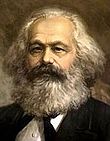- Democracy in Marxism
-
Part of a series on Marxism  Social sciencesAlienation · Bourgeoisie
Social sciencesAlienation · Bourgeoisie
Base and superstructure
Class consciousness
Commodity fetishism
Exploitation · Human nature
Ideology · Proletariat
Private property
Reification · Cultural hegemony
Relations of production
Scientific socialism
ImmiserationCapitalist mode of production
Socialist mode of production
Capital accumulation
Commodity (Marxism)
Marxian economics
Communism
Economic determinism
Labour power · Law of value
Means of production
Mode of production
Perspectives on Capitalism
Productive forces
Surplus labour · Surplus value
Transformation problem
Wage labour · Crisis theoryHistoryCategoriesAll categorised articlesCommunism portal 
The Marxist view is fundamentally opposed to liberal democracy believing that the capitalist state cannot be democratic by its nature, as it represents the dictatorship of the bourgeoisie. Marxism views liberal democracy as an unrealistic utopia. This is because they believe that in a capitalist state all "independent" media and most political parties are controlled by capitalists and one either needs large financial resources or to be supported by the bourgeoisie to win an election. Lenin (1917) believed that in a capitalist state, the system focuses on resolving disputes within the ruling bourgeoisie class and ignores the interests of the proletariat or labour class which are not represented and therefore dependent on the bourgeoisie's good will:
"Democracy for an insignificant minority, democracy for the rich – that is the democracy of capitalist society. If we look more closely into the machinery of capitalist democracy, we see everywhere, in the “petty” – supposedly petty – details of the suffrage (residential qualifications, exclusion of women, etc.), in the technique of the representative institutions, in the actual obstacles to the right of assembly (public buildings are not for “paupers"!), in the purely capitalist organization of the daily press, etc., etc., – we see restriction after restriction upon democracy. These restrictions, exceptions, exclusions, obstacles for the poor seem slight, especially in the eyes of one who has never known want himself and has never been in close contact with the oppressed classes in their mass life (and nine out of 10, if not 99 out of 100, bourgeois publicists and politicians come under this category); but in their sum total these restrictions exclude and squeeze out the poor from politics, from active participation in democracy.” (Lenin, State and Revolution, Chapter 5)
Most of these restrictions no longer apply in the Western world; women have the vote and there is no property requirement. However, Marxists generally agree that the modern political landscape is dominated by corporate interest, due to the widespread practice of lobbying politicians, and the connections between corporations, and elected officials.
Moreover, even if representatives of the proletariat class are elected in a capitalist country, Marxists claim they have limited power over the country's affairs as the economic sphere is largely controlled by private capital and therefore the representative's power to act is curtailed. Essentially, minarchists (only a small minority of those supporting liberal democracy) claim that in the ideal liberal state the functions of the elected government should be reduced to the minimum (i.e. the court system and security). Hence Marxists-Leninists see a socialist revolution necessary to bring power into hands of oppressed classes.
Lenin insisted that bourgeois democracy is in fact a dictatorship of bourgeoisie[1], while dictatorship of proletariat is the highest possible form of democracy and should use violence against opposing classes.
- Marx: “Democracy is the road to socialism."
- Marx: “...When the workers replace the dictatorship of the bourgeoisie by their revolutionary dictatorship ... to break down the resistance of the bourgeoisie ... the workers invest the state with a revolutionary and transitional form ...
- Engels: “...And the victorious party” (in a revolution) “must maintain its rule by means of the terror which its arms inspire in the reactionaries. Would the Paris Commune have lasted more than a day if it had not used the authority of the armed people against the bourgeoisie? Cannot we, on the contrary, blame it for having made too little use of that authority?...
- Engels: “As, therefore, the state is only a transitional institution which is used in the struggle, in the revolution, to hold down one’s adversaries by force, it is sheer nonsense to talk of a ‘free people’s state’; so long as the proletariat still needs the state, it does not need it in the interests of freedom but in order to hold down its adversaries, and as soon as it becomes possible to speak of freedom the state as such ceases to exist ....
- Lenin: The revolutionary dictatorship of the proletariat is ruled, won, and maintained by the use of violence by the proletariat against the bourgeoisie, rule that is unrestricted by any laws.
- Lenin: A state of the exploited must fundamentally differ from such a state; it must be a democracy for the exploited, ‘and a means of suppressing the exploiters; and the suppression of a class means inequality for that class, its exclusion from “democracy”.[1]
Communist states are widely seen as being de facto dictatorships by bourgeois critics, since the elections they held tended to be heavily rigged. [2]
See also Criticisms of communist regimes and Criticisms of Marxism.
Criticism
Main article: Criticisms of MarxismMain article: Criticisms of Communist party ruleSee also
- Soviet Republic
- Dictatorship of the proletariat
- Workers' council
- Council democracy
- Council communism
- Luxemburgism
- Direct democracy
Notes
- ^ V.I.Lenin. Full collection of works, 4th edition, vol. 25, p.385
Categories:- Communism
- Marxism
- Marxist theory
- Political ideologies
- Political theories
- Social democracy
- Socialism
- Trotskyism
Wikimedia Foundation. 2010.
